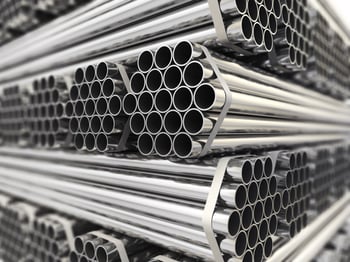When you need a clean room to maintain a measurably sanitary environment, you may look into building a hardwall clean room, but increasingly people are turning to Modular Clean Room walls because they can get the same controlled environment for less money and hassle. But before you invest in cleanroom wall panels, there are a few things you need to know.
1. What Are Modular Clean Room Walls Made Of?
Modular clean room walls are typically made from steel frames with glass/plexiglass or clear vinyl/PVC curtains. They may include materials like:
They may include materials like:
- Painted aluminum
- Melamine
- Vinyl-covered gypsum
The material you choose can change the look and feel of the room to meet your preferences. But these rooms will always be designed to meet the cleanliness guidelines required by your industry. The materials are chosen because they're easy to clean and maintain. They do not attract or retain dust, dirt, or moisture. They last for a long time with frequent use. The core of each wall is usually a honeycomb structure, which helps maintain the consistent temperature required within the modular cleanroom wall.
In addition to the walls, modular clean room panels include other materials and features like:
- Electrical outlets
- Hepa filters
- Anti-static technology
- Climate control
- Strategically-placed doors
- Windows to spec
- Specialized furniture
Your modular clean room design team will make sure all of these items and their materials meet the needs of various clean room environments.
2. Can Modular Clean Room Panels Be Reconfigured?
Yes! This is one of the great things about modular clean room panels. Traditional clean rooms must be planned, designed, constructed, and maintained permanently. It would be costly to reconfigure a traditional clean room because it's built into your building. But with clean room modular wall systems, if your needs change or you need to meet higher cleanliness standards, it's relatively easy to transition the room. And, yes, many people do find the need for reconfiguration does arise, and they're glad they thought ahead and chose a reconfigurable solution.
For example, let's say you move facilities. Instead of trying to build a new clean room in your new building, you can just pack up the one you have, move it, and put it back together. This modular panel system is designed for easy assembly by just a few people who can follow the easy-to-understand instructions.
Modular clean rooms are ideal for applications like:
- Specialized manufacturing (electronics, pharmaceuticals, medical equipment, etc.) where contamination could be a costly mistake.
- Research where you must maintain the integrity of the experiments
- Optics, where high-resolution images could be ruined if dust were in the room or on equipment
- Biohazard management to prevent the spread of dangerous pathogens
- Military and aerospace, where measurements and preparation must be precise and unadulterated by dust or pollution
- The cannabis industry, which must now meet many of the standards previously applicable only to pharmaceuticals
3. Can Modular Clean Room Walls Be Installed More Quickly?
With a traditional clean room, you might have to section off an area of your building for a week or more to get a room built. They may have to move doors and windows to meet cleanroom standards. That's not an easy or inexpensive adaptation. You may have to work with multiple contractors and professionals like HVAC, electrical, ductwork, and masonry. Coordinating these professionals may cause the project to take even longer.
room built. They may have to move doors and windows to meet cleanroom standards. That's not an easy or inexpensive adaptation. You may have to work with multiple contractors and professionals like HVAC, electrical, ductwork, and masonry. Coordinating these professionals may cause the project to take even longer.
In comparison, everything in a modular cleanroom is pre-fabricated, so it's a matter of putting the pieces together. Most people can assemble a modular clean room over a weekend, not a week or months. And you don't have to hire skilled professionals for this project. It's designed so that some of your more handy co-workers or people who do "handiwork" can put it together.
Permanent clean rooms also take more time to design because those developing the blue print have to figure out how to "make it work" in your existing space. Setting up a dedicated HVAC system in a permanent structure is a big and arduous ordeal. This often requires creative solutions. On the other hand, clean room modular wall systems are designed to set up just about anywhere you have access to electricity. It's self-contained and ready to go. It already meets cleanliness standards when built according to the instructions.
4. Do Modular Clean Room Walls Cost Less?
You probably already know the answer. Because modular wall systems are pre-designed, prefabricated, and pre-certified to meet cleanliness standards, a lot of the cost that would exist in a traditional clean room in your building is already absorbed, so you will pay less. The average 10 X 10' hardwall clean room costs around $150,000 to design and build. In comparison, a modular system is around $10,000-$15,000.
Up front, clean room modular wall systems are less expensive, but what about the long-run? In the long-term, you also save money. They last and they save you substantial costs if you need to add, take away parts or move them altogether. To move or adjust a permanent clean room, you'd have to tear much of it down and/or start from scratch.
Modular clean room panels are the modern, cost-effective solutions that industries need.
5. Can Modular Clean Room Walls Be Customized
Yes. Just because they're pre-designed does mean you're stuck with out-of-the-box boring options. The clean room modular wall systems themselves can be customized with wall and door placement, materials, height of the walls, door colors, cut-outs, HVAC systems, openings for lighting, etc. What’s inside the cleanroom wall panels can also be customized, from the workbenches to countertops and fume hood.
Regardless of the features you choose for your modular clean room panels, we can ensure cleanroom environments meet the cleanliness standards of your industry.


